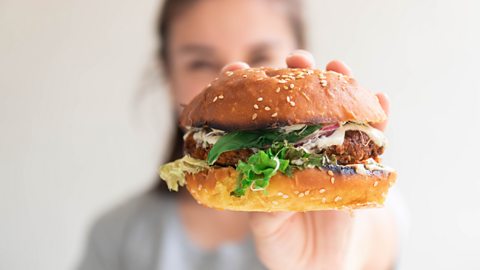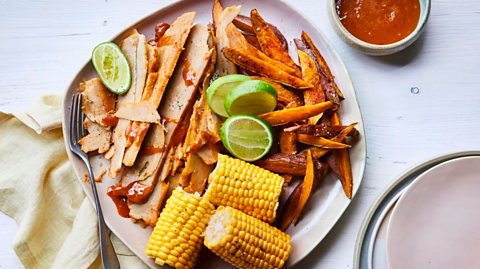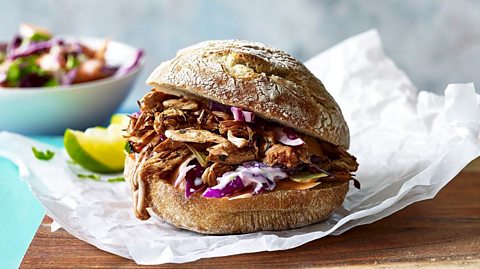How to save money on your plant-based shop
Fancy the idea of doing Veganuary? Weβve looked at how can you eat an exciting and healthy plant-based diet, without breaking the bank.

Make your own
If youβve recently started eating a more plant-based diet, you could find yourself spending more money than you used to on your weekly shop. The increased interest in plant-based diets has brought a wide range of vegan foods to supermarkets. Specialist products can be sold at a premium and interesting, flavoursome vegan recipes can often require many more ingredients. Cooking from scratch is an exciting journey of discovery and a must for your health and bank account. So where do you start?
Weβre a recipe website, so of course weβre going to say make your own, but processed food, even if itβs vegan, is still processed food. Youβll find it bulked out with mystery ingredients, salt and sugar. And while ready-made products may offer convenience, and may promise initial savings, in the long run they are usually more expensive than doing it yourself.
50p seitan
On TikTok you may have seen this called βvegan chickenβ, but seitan is its official name and it has being around for a long time (and we mean centuries). Itβs also sometimes referred to as wheat meat.
Buying seitan in the shops could set you back a few bob, but making it at home is as cheap as a 50p bag of flour. You can make seitan using a product called vital wheat gluten, found in health stores and online, which is flour with the starch removed, leaving behind the gluten. However, you can also use bog-standard plain flour, costing just pennies. To make it, you soak and then wash a ball of dough in the sink. There are a variety of cooking methods from steaming to boiling, frying and baking, but it can be used in stir-fries, for a chicken-breast-style meal, skewers or even as crispy vegan dippers.
Click or tap the image below to find out how to make it.
Basically free vegan mayonnaise
A mayonnaise substitute can be made in 10 seconds with the miracle liquid that is aquafaba. Save the water from a tin of chickpeas (or the water from cooking them yourself) and mix a few tablespoons with oil, salt, vinegar and mustard. Itβs basically a free-biproduct, if you use the chickpeas for dinner too. Aquafaba also makes fantastic vegan meringues, thickened icing and binds vegan cookies.
Full disclosure β you may need a bit of kit to fully utilise aquafaba. A stick blender is a useful investment, especially one that has a small food processor. Cheap ones have been as low as Β£10 but spending slightly more ensures youβll have the horsepower to blend lots of things, not just making mayo. An electric whisk will also save your wrists when whipping up the liquid to make meringues. Perfect additions to your Christmas list!
Nifty soy savings
Dehydrated soya chunks and mince can be much cheaper than some frozen or fridge-stored proteins. These are often sold in the world foods aisle. These little dried cubes of protein-packed soya need to be boiled in water to rehydrate them. After draining they are brilliant for simmering in curry sauces, stews and soups, when they can absorb flavour from the liquid. You can also marinate the rehydrated cubes and fry them for little flavoursome bites.
The variety of tofu you can find outside of mainstream supermarkets is mind-boggling (just check any marinated varieties for fish sauce). Buying plain tofu and marinading it yourself is easy if youβre looking for the lowest price. Silken tofu is very versatile and good for blending into vegan chocolate mousse, making creamy vegan pasta sauce, vegan cheesecake or the famous Sichuan mapo tofu, while firm tofu is better for stir-fries and even burgers.
There are some eye-popping prices on yoghurt alternatives. But a humble soy yoghurt is fairly reliably good value in supermarkets. If youβre not a fan of soy yoghurt, you could have a go making your own. Use your preferred milk alternative and some starter culture. After this initial outlay, you may be able to use your own live yoghurt to kick start each batch. But itβs an investment of time and materials as it might take a while to tweak the recipe to your liking.
Burgers for bucks
Beans and lentils are a veganβs best friend for providing cheap and filling protein but items such as shop-bought bean burgers can be quite pricey, as you have paid for them to be made and frozen for you. Dried pulses and beans are all within pennies of each other at the big supermarkets. A pack of dried beans or chickpeas will yield roughly double its weight when cooked, so a 500g pack will give you the equivalent of four drained tins. Thatβs half as cheap as the cheapest tins! If you like the convenience of cooked beans immediately, you can batch cook and freeze cooked beans. Theyβll cook from frozen very quickly. Tins are variable in price but are mostly cheap. Bulk buying tins when theyβre on offer is a good way to save as they will keep for ages and always come in handy. You can make burgers from any kind of beans and even chickpeas.
Jackfruit products have begun appearing on supermarket shelves, and they make a reasonably convincing 'pulled pork' subsitute. It is cheaper to buy it in a tin and make your own meals with it, rather than getting it pre-prepared, but bear in mind that the nutritional content is not comparable to meat.
Tofu, however, is packed with protein and is a brilliant source of plant-based nutrition. Firm tofu makes for a brilliant, sturdy burger with bite. Plain tofu doesn't taste of much by itself, but it soaks up all the wonderful flavours and sauces you mix it with. Gaz Oakley's Sriracha tofu burger is heaven on a plate.
Cheap and cheesy
New vegan cheese alternatives have been rapidly increasing on shop shelves at a variety of price ranges. One way to have a savoury, cheesy flavour on hand in the store cupboard, is to invest in a pot of nutritional yeast. "Nootch" is a deliciously savoury powder that can be mixed with breadcrumbs for crunchy, cheesy toppings or stirred into sauces, vegetables, and soups. The flavour is highly moreish and contains vitamin B12.
You can make your own vegan cream cheese by blending nuts, "nootch" and a handful of other ingredients. Straining yoghurt alternatives in a cheesecloth overnight produces a lovely cream cheese-like texture too. A vegan hard cheese that can be sliced or grated can be made at home as well. It may not be much cheaper, but it will taste fresher and you'll know exactly what's in it.
Sugar is sugar
Agave, maple and other syrups, often used as honey alternatives, can be relatively expensive, so consider whether the job can't be done by a pinch of sugar instead. Of course, if you want maple for its distinctive flavour, there is no real alternative, although brown sugar adds a nice deep flavour too. There's no evidence any sugar is particularly better (or worse) for you than another, so don't fork out for so-called "natural" sugar products. If you need a syrup, simmering standard sugar with a little water will do the trick in some circumstances and stiring in warm spices such as cinnamon or nutmeg is delicious on pancakes too!
Know your nuts
Nuts are a delicious and healthy plant snack. Nuts in the world foods aisle can be cheaper per 100g than in the baking aisle, but they may come in a larger bag. You can freeze nuts (especially good to do when buying reduced produce, such as after Christmas) to keep them fresh for longer. Unless the recipe you're using is very specific (such as pecan pie), don't be afraid to swap in cheaper nuts in some recipes, such as pesto. Almonds, peanuts and cashews are much cheaper than pecans, pistachios or pine nuts. Chopped mixed nuts are usually the cheapest.
Plain nuts are healthier than the sweetened or salted kind, that's not to say you can't enjoy these in moderation, but the unseasoned variety doesn't have to be boring either. Roasted nuts have a richer, stronger flavour, especially almonds, peanuts and hazelnuts. You can also sprinkle over delicious seasons such as chilli powder, cinnamon and even vanilla or almond extracts.
Shop around for own-brand 100 percent nut butters to avoid products with added sugar. There are some very cheap ones around as the popularity of this high-protein product grows. Donβt be tempted to bulk buy nut butters as they are generally the same price per 100g and nut butters can go rancid. You can make your own almond butter if you have a sturdy blender and find a good price on whole almonds.
Ground flaxseed makes a good egg replacer. But buying ground flaxseed usually more expensive than grinding your own in an electric coffee grinder. Small amounts can be done in a pepper mill if you donβt have a coffee grinder, but a cheap coffee grinder can be around Β£10 and a pepper mill can be Β£5. Spices can also be ground in a coffee grinder.
*This article was written in October 2021

